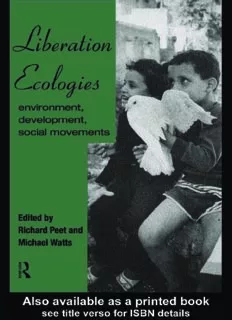
Liberation Ecologies PDF
Preview Liberation Ecologies
LIBERATION ECOLOGIES Driven by momentous economic and political changes and by apocalyptic visions of impending global ecological doom, the environmental question and the future of development have taken center stage. Yet no discussion of environment or development can begin without interrogating these keywords and the various discourses and practices in which they are situated. Liberation Ecologies explores contemporary debates over the real definitions of “development” and “environment.” Bringing together some of the very best theorists in the Development field, the book discusses the theory, growth, and impact of political ecology, and casts new light on the effects of development on environment in the Third World. Presenting a wide range of case studies from, amongst others, Ecuador, Madagascar, Gambia, China, Zimbabwe, and Indonesia, the book questions the realities and impact of sustainability, and confirms that eradicating poverty through enhancing and protecting livelihood strategies is as much an environmental sustainability issue as a “simple” asset or resource question. Liberation Ecologies highlights new theoretical engagements between political ecology and poststructuralism, and challenges many conventional notions of development, politics, democracy, and sustainability. Richard Peet is Professor of Geography, Clark University, Massachusetts; Michael Watts is Professor of Geography and Director of the Institute of International Studies, University of California, Berkeley. LIBERATION ECOLOGIES Environment, development, social movements Edited by Richard Peet and Michael Watts London and New York First published 1996 by Routledge 11 New Fetter Lane, London EC4P 4EE This edition published in the Taylor & Francis e-Library, 2002. Simultaneously published in the USA and Canada by Routledge 29 West 35th Street, New York, NY 10001 © 1996 Richard Peet and Michael Watts All rights reserved. No part of this book may be reprinted or reproduced or utilised in any form or by any electronic, mechanical, or other means, now known or hereafter invented, including photocopying and recording, or in any information storage or retrieval system, without permission in writing from the publishers. British Library Cataloguing in Publication Data A catalogue record for this book is available from the British Library Library of Congress Cataloging in Publication Data A catalog record for this book is available from the Library of Congress ISBN 0-203-03292-6 Master e-book ISBN ISBN 0-203-21162-6 (Adobe eReader Format) ISBN 0-415-13361-0 (hbk) ISBN 0-415-13362-9 (pbk) CONTENTS List of illustrations vii List of contributors ix Preface x 1 LIBERATION ECOLOGY Development, sustainability, and environment in an age of market triumphalism Richard Peet and Michael Watts 1 2 CONSTRUCTING NATURE Elements for a poststructural political ecology Arturo Escobar 46 3 IMPROVED SEEDS AND CONSTRUCTED SCARCITY Lakshman Yapa 69 4 MOVEMENTS, MODERNIZATIONS, AND MARKETS Indigenous organizations and agrarian strategies in Ecuador Anthony Bebbington 86 5 DISCOURSES ON SOIL LOSS IN BOLIVIA Sustainability and the search for socioenvironmental “middle ground” Karl S.Zimmerer 110 6 MARXISM, CULTURE, AND POLITICAL ECOLOGY Environmental struggles in Zimbabwe’s Eastern Highlands Donald S.Moore 125 7 DEFINING DEFORESTATION IN MADAGASCAR Lucy Jarosz 148 8 CONVERTING THE WETLANDS, ENGENDERING THE ENVIRONMENT The intersection of gender with agrarian change in Gambia Judith A.Carney 165 CONTENTS 9 GENDER AND CLASS POWER IN AGROFORESTRY SYSTEMS Case studies from Indonesia and West Africa Richard A.Schroeder and Krisnawati Suryanata 188 10 FROM CHIPKO TO UTTARANCHAL Development, environment, and social protest in the Garhwal Himalayas, India Haripriya Rangan 205 11 THE POLITICAL ECOLOGY OF AGRARIAN REFORM IN CHINA The case of Heilongjiang Province Joshua S.S.Muldavin 227 12 CONCLUSION Towards a theory of liberation ecology Michael Watts and Richard Peet 260 Index 270 vi ILLUSTRATIONS TABLES 1.1 A map of development discourse 22 11.1 Natural disaster claims for Songhuajiang township, 1981–9 252 FIGURES 3.1 Improved seeds: the nexus of production relations 72 6.1 Kaerezi Resettlement Scheme and Nyanga National Park, Zimbabwe 30 7.1 Madagascar 155 8.1 Gambia 167 8.2 Agro-ecological zones, central Gambia 169 8.3 Irrigated rice projects in Gambia 175 10.1 Uttaranchal region, northern India 212 11.1 Shifts in China’s rural political economy 232 11.2 Grain production, yields, and fertilizer use (1984–9) 235 11.3 Heilongjiang Province, China 240 11.4 (a) The process of sodic alkalinization in grasslands 243 (b) Sheep population 1949–83, Zhaozhou County 243 vii CONTRIBUTORS Anthony Bebbington is Professor of Geography, University of Colorado, Boulder, Colorado. Judith A.Carney is Professor of Geography, University of California, Los Angeles, California. Arturo Escobar is Professor of Anthropology, University of California, Berkeley, California. Lucy Jarosz is Professor of Geography, University of Washington, Seattle, Washington. Donald S.Moore is Wantrup Fellow, Institute of International Studies, University of California, Berkeley, California. Joshua S.S.Muldavin is Professor of Geography, University of California, Los Angeles, California. Richard Peet is Professor of Geography, Graduate School of Geography, Clark University, Worcester, Massachusetts. Haripriya Rangan is Visiting Professor of Geography, University of Kentucky, Lexington, Kentucky. Richard A.Schroeder is Professor of Geography, Rutgers University, New Brunswick, New Jersey. Krisnawati Suryanata is Professor of Geography, University of Denver, Denver, Colorado. Michael Watts is Director, Institute of International Studies, University of California, Berkeley, California. Lakshman Yapa is Professor of Geography, Pennsylvania State University, Pennsylvania. Karl S.Zimmerer is Professor of Geography, University of Wisconsin, Madison, Wisconsin. ix
Description: